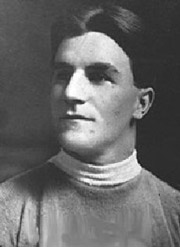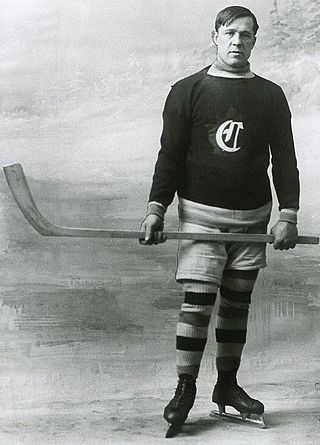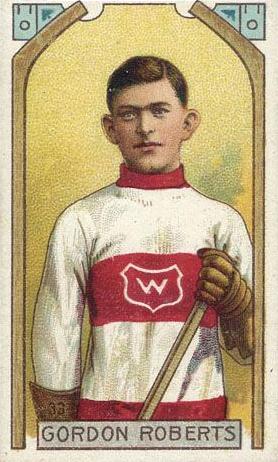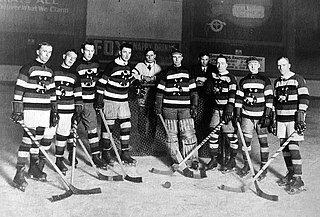The Pacific Coast Hockey Association (PCHA) was a professional ice hockey league in western Canada and the western United States, which operated from 1911 to 1924 when it then merged with the Western Canada Hockey League (WCHL). The PCHA was considered to be a major league of ice hockey and was important in the development of the sport of professional ice hockey through its innovations.
The 1917–18 NHL season was the first season of the National Hockey League (NHL) professional ice hockey league. The league was formed after the suspension of the National Hockey Association (NHA). Play was held in two halves, December 19 to February 4, and February 6 to March 6. The Canadiens won the first half, and Toronto the second half. The season was contested by four teams, down from six in the previous season, finishing with only three, in Montreal, Ottawa and Toronto. The Montreal Wanderers withdrew early in January 1918 after their rink, the Westmount Arena, burned down. Toronto won the NHL playoff and then won the Stanley Cup, by defeating the PCHA's Vancouver Millionaires three games to two in a best-of-five series.
The Seattle Metropolitans were a professional ice hockey team based in Seattle, Washington, playing in the Pacific Coast Hockey Association (PCHA) from 1915 to 1924. During their nine seasons, the Metropolitans were the PCHA's most successful franchise, as they went 112–96–2 in their nine years as a franchise. The Metropolitans also won the most regular season PCHA championships, winning five times, with Seattle finishing second on three other occasions. The Metropolitans played their home games at the 2,500 seat Seattle Ice Arena located downtown at 5th and University.

Bernard Patrick Morris was a Canadian professional ice hockey player. He played for the Seattle Metropolitans of the Pacific Coast Hockey Association (PCHA) from 1915 to 1923. When the Metropolitans became the first U.S.-based team to win the Stanley Cup in 1917, Morris scored 14 of Seattle's goals. Morris also played for the Calgary Tigers, Boston Bruins, and various minor league teams.

Jean-Baptiste "Jack" Laviolette was a Canadian professional ice hockey player. Laviolette played nine seasons for the Montreal Canadiens hockey club and was their first captain, coach, and general manager.

Joseph George Didier "Cannonball" Pitre was a Canadian professional ice hockey player. Nicknamed "Cannonball," he was renowned for having one of the hardest shots during his playing career. One of the first players to join the Montreal Canadiens, Pitre and his teammates' French-Canadian heritage led to the team being nicknamed The Flying Frenchmen. His teammates on the Canadiens included Jack Laviolette and Newsy Lalonde.

Frank Corbett "Flash" Foyston was a Canadian professional ice hockey player and coach. Foyston was a member of Stanley Cup championship teams three times: with the Toronto Blueshirts in 1914, the Seattle Metropolitans in 1917, and the Victoria Cougars in 1925. While with the Metropolitans, he twice led the Pacific Coast Hockey Association (PCHA) in goals. After his retirement from playing, Foyston became a minor league head coach. He was inducted into the Hockey Hall of Fame in 1958.

Gordon William "Doc" Roberts was a Canadian professional ice hockey forward who played for the Ottawa Hockey Club and Montreal Wanderers of the National Hockey Association (NHA) and the Vancouver Millionaires and Seattle Metropolitans of the Pacific Coast Hockey Association (PCHA). He was a member of the Ottawa team that defended the Stanley Cup in a 1910 challenge; Roberts scored seven goals in two games in his team's victory over the Edmonton Hockey Club. He moved to Montreal in 1910 where he was consistently among the NHA's leading scorers with the Wanderers while also studying medicine at McGill University.

John Phillip "Jack" Walker was a Canadian professional ice hockey forward who played for the Toronto Blueshirts, Seattle Metropolitans, Victoria Cougars, and Detroit Cougars. He played in all the big professional leagues at the time: the National Hockey Association (NHA), Pacific Coast Hockey Association (PCHA), Western Canada Hockey League (WCHL), and National Hockey League (NHL).
The 1916 Stanley Cup Finals was played between the National Hockey Association (NHA) champion Montreal Canadiens and the Pacific Coast Hockey Association (PCHA) champion Portland Rosebuds. This was the first time that a best-of-five Cup championship went the distance. Also, the Rosebuds were the first team based in the United States to play for the Cup. The Canadiens defeated the Rosebuds three games to two in the best-of-five-game series. This was the Canadiens' first Stanley Cup championship.
The 1919 Stanley Cup Finals was the ice hockey playoff series to determine the 1919 Stanley Cup champions. The series was cancelled due to an outbreak of Spanish flu after five games had been played, and no champion was declared. It was the only time in the history of the Stanley Cup that it was not awarded due to a no-decision after playoffs were held.
The 1920 Stanley Cup Finals was contested by the National Hockey League (NHL) champion Ottawa Senators and the Pacific Coast Hockey Association (PCHA) champion Seattle Metropolitans. The Senators won the series by three games to two in the best-of-five game series. Although all of the games for the series were scheduled to be played at The Arena in Ottawa, unseasonably warm weather and poor ice conditions forced the last two contests to be played on the artificial ice at Toronto's Arena Gardens.
The 1916–17 NHA season was the eighth and final season of the National Hockey Association. Six teams were to play two half-seasons of ten games each, but this was disrupted and only four teams finished the season. The Montreal Canadiens defeated the Ottawa Senators in a playoff to win the NHA championship.
The 1914–15 NHA season was the sixth season of the National Hockey Association and played from December 26, 1914, until March 3, 1915. Each team played 20 games. The Ottawa Senators won the NHA championship in a two-game, total goal playoff against the Montreal Wanderers. The Senators, however fell to the Vancouver Millionaires of the Pacific Coast Hockey Association in the Stanley Cup championship. It was the second 'World's Series' between the NHA and the PCHA for the Stanley Cup.

The 1913–14 NHA season was the fifth season of the National Hockey Association (NHA). At the end of the regular season, a tie for first place necessitated a playoff to determine the championship. The Toronto Hockey Club defeated the Montreal Canadiens 6–2 in a two-game, total-goals playoff. The Torontos then played the Victoria Aristocrats of the Pacific Coast Hockey Association (PCHA) in the first Stanley Cup 'World's Series' between the leagues.
The 1915–16 PCHA season was the fifth season of the professional men's ice hockey Pacific Coast Hockey Association league. Season play ran from December 7, 1915, until February 25, 1916. Each team would play 18 games. The Portland Rosebuds club would be PCHA champions. After the season the club would play the Stanley Cup Finals series against the Montreal Canadiens, NHA champions. Montreal would win the best-of-five series 3–2 to win the Cup.

The 1919 PCHA season was the eighth season of the professional men's ice hockey Pacific Coast Hockey Association league. Season play ran from January 1 to March 10. The season was increased to 20 games per team.
The 1916–17 Montreal Canadiens season was the team's eighth season and eighth and last season of the National Hockey Association (NHA). The Canadiens entered the season as league and Stanley Cup champions. The Canadiens qualified for the playoffs by winning the first half of the season. The Canadiens then won the league playoff to win their second league championship, but lost in the Stanley Cup Finals series to Seattle.
The 1917–18 Montreal Wanderers season was the 15th and final season of play of the Montreal Wanderers ice hockey club. Along with the Canadiens, Ottawa and Quebec, the club voted to suspend the National Hockey Association (NHA) and form the National Hockey League (NHL) to freeze out the Toronto NHA franchise owner. On the ice club still had difficulties fielding a competitive club, and when the Montreal Arena burned down, owner Sam Lichtenhein elected to suspend the club. The team is officially credited with having played six games, though they only actually played the first four; the other two were declared forfeit.
The 1914 Stanley Cup Finals was a series between the Victoria Aristocrats, champions of the Pacific Coast Hockey Association (PCHA), and the Toronto Hockey Club, champions of the National Hockey Association (NHA). The Torontos defeated the Aristocrats in three games to win the best-of-five series. It was the first officially sanctioned series for the Stanley Cup between the two leagues, starting the "World's Series" era where the NHL champion played off against a PCHA or Western league champion annually for the Stanley Cup. It was also the final series of the "challenge" era, where inter-league series for the Stanley Cup were sanctioned by the Stanley Cup trustees. An anticipated follow-on challenge series between Toronto and Sydney, champions of the Maritime League did not take place as Sydney abandoned their challenge for the Cup.











